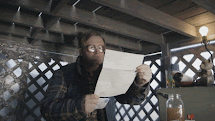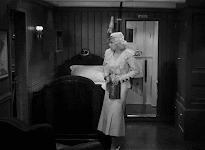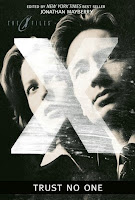It’s Thursday morning and it struck me that I don’t have anything ready for the ranty blog. I’ve had a few different ideas rattling around in my head for posts about endings and comedy and jargon. But they’re all kinda big things and a bit… delicate? I don’t want to be giving bad, half-thought-out advice, and I’m not 100% sure that I have good advice on these precise topics quite yet. Thus all the rattling around in my head.
Or maybe those are LEGO bricks? Might be. Really, anything goes in 2020.
Hey, speaking of years and what’s possible and what’s acceptable, I realized I could babble on for a minute or two about a topic that pops back up every four or five months.
See, I recently watched an adaptation of something I loved many years back. And, being a proper nerd who read and re-read the original and then read it again a seventeenth time, I picked out little changes here and there. I mean, yeah, it’s an adaptation. Things are going to change. They always do because they need to. But these were different changes. A lot of them were in how people were addressed. How other people reacted to them. Nothing gigantic, but it stood out to me because—as I said—I was a big fan of the original.
Okay, fine, I was nitpicking.
Anyway, I can’t remember at what point in the movie it clicked, but it hit me that the movie had updated a lot of the original story’s views on sexuality and gender. Just little tweaks, nothing that affected the plot in any way. But the movie was a bit more modern, inclusive, and—in a few places—a little less mocking.
I thought Good on them.
But then, shortly afterward, I had another moment. Because, hang on a minute, I’d read this many, many times back in those formative years and I’d never noticed any places where people were excluded or mocked or anything like that. The book was fine. Was this movie overreacting? Were they just changing things in the adaptation to please a tiny, vocal minority?
And the more I thought about it, the more I realized ohhhhhhhh no. No they weren’t. I just didn’t notice because, at the time… I was cool with all of that. My views then echoed a lot of the views of, well, then. Just like the book did.
This book was big for me. If someone asked me, it’d probably end up on my personal list of “twelve most influential books/authors” or something like that. But… yeah, it’s got some flaws. The book is a fixed artifact of thenand there are aspects of it that the world has moved past. And, thankfully, I’ve moved past.
It’s a rough thing to go back and realize things you loved in the past don’t quite measure up anymore. Sometimes in minor ways, sometimes in… well, really big ones. I re-read a classic sci-fi novel a year or two back and it terrified me with some of its views on sex. Re-read another formative series to my partner when she was really sick and discovered wow was there a lot of casual racism in it. Just a few weeks ago I watched one of my favorite comedy movies from my teens, one I must’ve seen this at least a dozen times (yay USA Up All Night) and holy crap that was just full-on, no question sexual assault, arguably attempted rape from the main character. That was seriously uncomfortable to watch.
And I get why admitting this sort of thing can be tough for people. To admit these early, formative works are flawed. That the people who made them were flawed. Because admitting this means opening ourselves up to the idea we might be flawed. We might’ve absorbed views and lessons that, in retrospect, were not good. It’s painful to think the movie adaptation of our life might get that same horrified reaction.
The world always changes. It progresses, it moves forward, and hopefully… we move with it. We learn more. We understand more. This sounds really dumb to say, but I’m very happy my views have grown and evolved since I was five. Or fifteen. Or twenty-five. Not on everything, but on a lot of things. It’s not weakness to say I’ve changed my views—it’s growth.
This doesn’t mean we have to abandon those old, formative works or throw them on bonfires. But we need to be honest and acknowledge what they really are… even when it means a bit of apology and internal cringing on our part. I can say this book and that book are on my list of formative things because… well, they were. I can’t deny it. They’re part of why I’m a writer today.
But I don’t need to embrace them or constantly defend them. I can admit their flaws—some minor and some seriously glaring—even if it possibly means admitting some flaws of my own. Because in writing and in life, I can’t improve if I never admit that I need improvement.
Anyway… just some random thoughts. I know other folks have said similar things in a better way.
Next time…
Well, as always, if anyone’s’ got a specific question, feel free to drop it in the comments below. Or over on a Writers Coffeehouse videoif you want to get answers from better writers. And if not, maybe I’ll sort out some of those bigger ideas to talk about.
Until then… go write.





